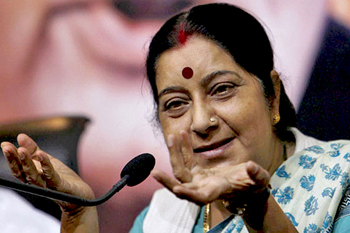New Delhi, Jul 22: A combative BJP top brass today rallied behind Union Minister Sushma Swaraj and two state chief ministers who are under Opposition attack over Lalit Modi row and Vyapam scam, asserting that they have done no wrong and there will be no resignations.
 Party leaders were also asked to aggressively "expose" Congress over its "disinformation campaign".
Party leaders were also asked to aggressively "expose" Congress over its "disinformation campaign".
The assertions came at the BJP parliamentary party meeting where Prime Minister Narendra Modi asked MPs to be "proud" of the Centre's work and BJP chief Amit Shah told them that all the states ruled by it were doing "a very good work with honesty. We have done no wrong."
The party put up a strong defence on a day when the Congress-led opposition continued to stall Parliament, demanding resignations of Swaraj and Madhya Pradesh and Rajasthan chief ministers Shivraj Singh Chouhan and Vasundhara Raje over Lalit Modi row and Vyapam scam.
The over 45-minute meeting saw Swaraj telling the parliamentarians that she offered no help to the former IPL boss, Naqvi told reporters after the meeting.
"I offered neither any financial benefit to him nor did I help him flee India. I never told the British government to give him travel documents. All I did was to tell them that their decision (on Lalit Modi's request) will not affect their ties with India," Naqvi said quoting her.
"Congress is trying to make a mountain out of a molehill. Here there is not even a molehill," she said and added that she had rejected pressure from some senior Congress leaders to give diplomatic passport to Coal scam accused Santosh Bagrodia. Swaraj had earlier tweeted about it.
She also strongly defended the Madhya Pradesh government over Vyapam scam, Naqvi said.
Shah called upon the party MPs and workers to strongly counter those with "distorted mindset", a dig at opposition parties, and said they, especially Congress, have no real issues against the Modi dispensation.
"We will expose those we are trying to disrupt our journey on the path to progress over fabricated issues. We will take them in Parliament and on streets... We will not let Congress succeed. Our state governments, our chief ministers are doing a very good work and doing it with honesty," Naqvi quoted Shah as saying.





Comments
Add new comment